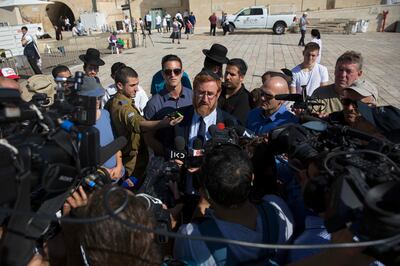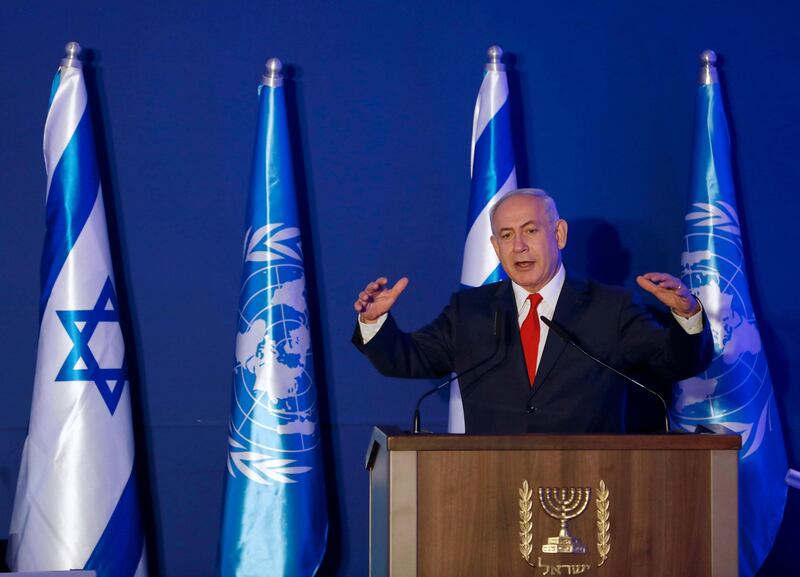Israeli prime minister Benjamin Netanyahu has vowed to never uproot any settlement in the occupied West Bank, prompting a backlash from Palestinians and raising new questions about the slow start for US peace efforts led by White House adviser Jared Kushner.
"We have returned here for good," Mr Netanyahu said at a ceremony on Monday night in the northern West Bank settlement of Barkan.
"There will be no more uprooting of settlements in the Land of Israel. Settlements will not be uprooted."
The Palestinians seek all of the West Bank, along with east Jerusalem and the Gaza Strip, for an independent state alongside Israel.
Hours later, UN secretary-general Antonio Guterres, who was in the West Bank city of Ramallah for a visit, condemned Israeli settlement construction and said the international community remained solidly behind the goal of Palestinian independence.
_______________
Read more:
Kushner's Middle East trip could help boost Arab cover for Israeli-Palestinian peace
[ Netanyahu's possible downfall gives Palestinians little reason for optimism ]
_______________
"I express very strongly the total commitment of the United Nations and my personal total commitment to the two-state solution," Mr Guterres said at a meeting with Palestinian prime minister Rami Hamdallah.
He added that settlement activity is illegal under international law, calling it an "obstacle" that needs to be removed.
Nabil Abu Rdeneh, spokesman for Palestinian president Mahmoud Abbas, denounced Mr Netanyahu's comments and urged the United States to intervene.
"This is an Israeli message to the US administration, which sought through an important tour in the area to do something in order to rescue the peace process," he said.
Mr Kushner and his envoy, Jason Greenblatt, have held a series of talks with Israeli and Palestinian leaders, as well as with leaders across the Arab world in an attempt to take a regional approach toward solving the decades-old conflict.
"We call upon the US administration to deal with these provocations," added Mr Abu Rdeneh. He said such provocations hinder US peace efforts and are "an attempt to return things to square one".
The Palestinians have expressed impatience with the White House, which has not yet offered a plan for forging peace despite US president Donald Trump's early pledges to pursue what he calls "the ultimate deal".
A senior White House official played down Mr Netanyahu's comments.
"It is no secret what each side's position is on this issue," the official said. "Our focus is on continuing our conversations with both parties and regional leaders to work toward facilitating a deal that factors in all substantive issues."
It came as Israeli lawmakers visited Al Aqsa mosque compound in Jerusalem on Tuesday for the first time in two years.
The visit by Knesset members Yehuda Glick and Shuli Mualem-Rafaeli, which passed peacefully, was meant to test the waters as Mr Netanyahu's government mulls whether to allow such visits to resume. They were banned in late 2015 for fear of sparking tensions.

The Israeli Ynetnews site reported that the visit was part of a pilot programme allowing Knesset members to hold visits to the compound that have been co-ordinated with police.
Members of the mainly Arab Joint List parliamentary alliance have said they are boycotting the programme, Ynetnews said.
Joint List member Ahmad Tibi reportedly denounced Mr Glick and Ms Mualem-Rafaeli as "right-wing extremists" who "broke into Al Aqsa Mosque with the help of the Israeli government and its police".
Al Aqsa mosque compound, which is known as Haram Al Sharif, is holy to both Muslims and Jews. The site has been at the centre of recent tensions after Israel installed, then removed, metal detectors at entrances to the compound following the deadly shooting of two Israeli policemen.
Muslims administer Haram Al Sharif, where Jews can visit but not pray.
_______________
Read more:
[ King Abdullah and Abbas agree to create Al Aqsa working group to counter Israel 'challenges' ]
[ Metal detector removal at Al Aqsa 'small victory in long battle for freedom' ]
[ Dozens injured in fresh clashes as worshippers return to Al Aqsa mosque ]
_______________






